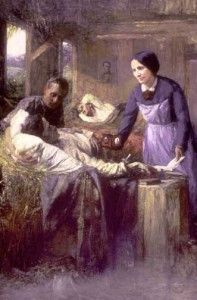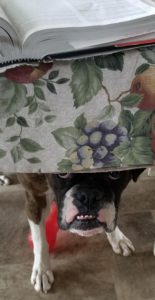I woke up at 4:00am. My heart was racing. The thoughts in my mind percolated like days-old coffee, muddy and dark. I thought of my son and his wife in the hospital trying deliver a baby in the midst of the worst pandemic to hit America in many years. And I thought of Jesus words to his disciples in Matthew 24:17-18, “Let the one who is on the housetop not go down to take what is in his house, and let the one who is in the field not turn back to take his cloak. And alas for women who are pregnant and for those who are nursing infants in those days!” I thought of that verse because people with the virus are at the hospital where my daughter-in-law was in labor, and there was nothing I could do to help them.
In such circumstances, where do I place my hope? How do I muster courage? Where can I find security? I don’t think it’s wrong to ask questions when one faces adversity. And that’s a good thing because I sure have a lot of questions.
Hope?
I turned on the television last night and searched through the channels for something to distract me from the onslaught of coronavirus chaos. I can’t escape it. I went to the grocery store and there were armed policemen standing by the exits and shoppers wearing masks and gloves. This is a horror movie come to life and I don’t like horror movies!
On tv, I flipped past the violence. I saw Vince Gill, singing from the Grand Ole Opry in Nashville—the recent seat of destruction after a deadly tornado. He was playing beautiful music, and then he and Marty Stuart talked about hope.
“Country music has always told the story of the human condition and that story is about how to hope.” – Marty Stuart
Music gives me hope. I’m not alone. Our musicians, singers and songwriters wield a powerful weapon. They slay the darkness with beautiful vibrations of sound. Like a defibrillator, they electrify the dead heart with joy.
I watched a video of Steven Curtis Chapman this morning that was written in the midst of his own heartache after the death of his daughter. The song was like a flickering flame, igniting hope into my soul.
“Until the blue returns to your skies, until the laughter returns to your eyes, I’ll be here crying with you, right here to give you a song to help you go on, until you are strong, ‘till the blue returns to your sky.”
The media hasn’t given me much hope. And between the doomsayers and the ne’er-do-wells, I have really struggled to get to the root cause of my anxiety. I feel restless—and not just because I’m stuck in my house. I want to do something productive to fight this sickness. Instead, I’m eating too much and bickering with the other people who live with me. The songs remind me of the proper response to sickness and death; tears.
The music in the songs connect the lyric with the heart. Sometimes they remind us that we all bleed. We all ache. We all long to see sad things come untrue. Sometimes they remind us to rejoice that we are alive. Sometimes the songs remind us to love and cherish what we have. Songs are important. Songs give us hope.
Courage?
I don’t feel particularly brave, but I’ve had to pretend to be brave for my children. It’s a frightful thing to face disease and death and it takes great courage not to flinch.
Stories from heroes who have overcome such things really do matter.
 I read a story the other night of an unlikely hero, “Louisa May Alcott”. The beloved author of “Little Women” and other beautiful fiction wrote another book many have never heard of titled, “Hospital Sketches and Camp and Fireside Stories”. One powerful true story from the book illustrates the need for courage in al circumstances.
I read a story the other night of an unlikely hero, “Louisa May Alcott”. The beloved author of “Little Women” and other beautiful fiction wrote another book many have never heard of titled, “Hospital Sketches and Camp and Fireside Stories”. One powerful true story from the book illustrates the need for courage in al circumstances.
Ms. Alcott was a nurse during the Civil War. She cared for Union soldiers in an army hospital in Washington, D.C. One soldier was a West Virginia blacksmith named John.
“I found a lately emptied bed occupied by a large, fair man, with a fine face, and the serenest eyes I ever met. He came in a day or two after the others. One of the earlier comers had often spoken of a friend who had remained behind that those apparently worse wounded than himself might reach a shelter first.”
So, Ms. Alcott befriended John when he eventually arrived at the hospital.
“A most attractive face he had, framed in brown hair and beard, comely featured and full of vigor, as yet unsubdued by pain; thoughtful and often beautifully mild while watching the afflictions of others, as if entirely forgetful of his own. His mouth was grave and firm, with plenty of will and courage in its lines, but a smile could make it as sweet as any woman’s; and his eyes were child’s eyes, looking on fairly in the face with a clear, straightforward glance, which promised well for such as placed their faith in him.”
John had an incurable wound and suffered immensely with no complaint. A doctor described his ailment to the nurse, Miss. Alcott.
“Every breath he draws is like a stab; for the ball pierced the left lung, broke a rib, and did no end of damage here and there; so, the poor lad can find neither forgetfulness nor ease, because he must lie on his wounded back or suffocate. It will be a hard struggle, and a long one, for he possesses great vitality; but even his temperate life can’t save him; I wish it could.”
“You don’t mean he must die, doctor?”
“Bless you, there’s not the slightest hope for him; and you’d better tell him so before long; women have a way of doing such things comfortably, so I leave it to you. He won’t last more than a day or two, at furthest.”
I could have sat down on the spot and cried heartily, if I had not learned the wisdom of bottling up one’s tears for leisure moments. Such an end seemed very hard for such a man, when half a dozen worn out, worthless bodies round him were gathering up the remnants of wasted lives, to linger on for years, perhaps, burdens to others, daily reproaches to homesick spirits, and make the heavy hours pass easier.”
She got to know him better as his hours drew to a close. She held him in her arms and comforted him. When it finally came time to share the awful truth with him, he took it well.
“This is my first battle; do they think it’s going to be my last?”
“I’m afraid they do, John.”
It was the hardest question I had ever been called upon to answer; doubly hard with those clear eyes fixed on mine, forcing a truthful answer by their own truth. He seemed a little startled at first, pondered over the fateful fact a moment, then shook his head, with a glance at the broad chest and muscular limbs stretched out before him:
“I’m not afraid, but it’s difficult to believe all at once. I am so strong it don’t seem possible for such a little wound to kill me.”
John explained to her how he never married because he was the oldest child to a widow and was busy raising a brother and sister, and caring for his mother.
“Shall I write to your mother now?” I asked, thinking that these sudden tidings might change all plans and purposes: but they did not; for the man received the order of the Divine commander to march with the same unquestioning obedience with which the soldier had received that of the human one, doubtless remembering that the first led him to life and the last to death.”
Miss Alcott stayed with him until the end. She did not falter with honesty but gave him the strength to face death even as he gave her the courage to live.
We need not lie to our children about the seriousness of the foul pestilence that stalks our land, nor should we exaggerate it. But whether one or many die in its grip, we must remember that one death is one too many. We must remember the numbers reflect real people and those people are precious to God and to their families.
And so, we must face the future with courage—even if it is borrowed courage. We are not the first to encounter such things nor will we be the last. But we must ask ourselves; what will my legacy be?
Security?
When our sense of security collapses, our world-view shatters. That is what we are experiencing today. The “me first” movement is thrashing and lashing out as the blows fall on its head. It seeks not for the health and well-being of its neighbor or for the betterment of society, and it is a frightful thing. It makes clear that when we place our security in ourselves, it is an awful truth to learn that we are actually weak, frail and helpless.
“Our deepest need for security is met through a personal relationship with God. By anchoring ourselves and our lives to Jesus Christ, we can be confident that our security is rock solid.” – Dr. Kathy Koch
Christians follow a man who claimed to be God. He was either a madman or the Savior of the world. There is no middle option. He said, if we believe he was who he said he was, and if we take up our cross and follow him, we will have eternal life after we die. He never said we would not suffer—that’s what the cross was: suffering. He never said we would not die—as many before us have proved. What he did offer was life—eternal life. He told the thief on the cross next to him, “Today, you will be with me in paradise.” If we place our hope and trust in him, he makes us secure in that hope.
“And because lawlessness will be increased, the love of many will grow cold. But the one who endures to the end will be saved.” Jesus – Matthew 24:12-13
The days ahead will reveal what kind of men and women we really are. We must not stop asking questions of God. We must weep at sad things and with others who weep over their dead. We must pray for our leaders, our friends, and our family. And we must cling to hope with courage, knowing with full security that we are held in the strong hands of a God who stoops low to meet us where we are.
Are you filled with anxiety? Me too. But I will continue to take my fear to the One who bears the weight of the cross for me. And I will keep walking, and carrying my cross. I hope you will too.

Leave a Reply